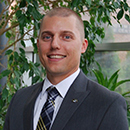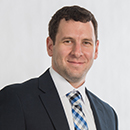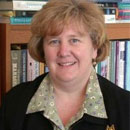Master of Science in Athletic Training
The Lasell University Master of Science in Athletic Training program is a Commission on Accreditation of Athletic Training Education (CAATE) accredited graduate program, delivered in a hybrid model (online and classroom experience) and designed to prepare students for eligibility to take the Board of Certification Exam (BOC).
Lasell's Connected Learning philosophy anchors the athletic training curriculum. Students are provided with opportunities to draw on both professional experience and newly acquired knowledge and skills to prepare for a career in a variety of settings. Rigorous coursework is complemented by opportunities to put learning into practice through a series of 5 clinical experiences. Students hone their clinical skills and decision-making through simulation, standardized patient encounters, and various lab-based activities.
Students participate in clinical experiences with preceptors in a variety of practice settings. The Lasell MSAT program utilizes a large network of clinical sites, including professional sports, collegiate, secondary schools, and world-renowned healthcare facilities. Through clinical experiences, students gain the skills to work collaboratively with other healthcare professionals to provide preventative services, emergency care, clinical diagnosis, therapeutic intervention, and rehabilitation.
The two-year curriculum is designed with student flexibility in mind. Students begin their MSAT journey remotely during the summer session and transition to on-campus learning for the next three semesters (fall, spring, and summer). This sequence provides significant time with faculty in the classroom and lab to develop clinical knowledge and skills. The second summer provides a transition from face-to-face learning to a remote model. During the final two semesters, courses are delivered in an on-line format to facilitate enhanced clinical experience opportunities both locally and nationally. Over the two-year (6 semesters) program, these rich educational experiences prepare students to provide exceptional healthcare and become leaders in the athletic training profession.
Program Costs
Students in the MSAT program will incur additional costs associated with their clinical education experiences, including the cost associated with travel and housing at affiliated clinical sites, dress code requirements, web-based assessment platforms, and professional memberships. Criminal background checks are not essential for all affiliated clinical sites. In the event that a clinical site requests a criminal background check for clinical placement, the student is responsible for the cost. The following is a list of associated student costs.
1. Lasell University Graduate Tuition and Campus Fees.
2. Course materials to include books, computer/laptop, and other resources.
3. Clinical Experience/Education Uniform (khaki/chino/dress style pants, polos, closed-toe shoes).
4. Lasell University Athletic Training logo apparel.
5. Transportation to and from clinical experience sites.
6. Room and board, including for clinical experiences.
7. Medical costs associated with immunizations, TB testing, or Covid-19 testing.
8. Maintenance of CPR/AED certification throughout the program.
9. Web-based assessment platform.
10. National Athletic Trainers’ Association Student Membership. ($85/year)
11. Criminal background check and/or drug screening as needed per clinical site requirements.
12. Board of Certification Exam. (Last semester in ATP $330)
| Course Code | Course Title | Credits |
|---|---|---|
| Core Courses | ||
| MSAT700 | Prof Behaviors & Evidence Based Practice | 3 |
| MSAT701 | Functional Anatomy | 3 |
| MSAT702 | Diagnostic Procedure | 3 |
| MSAT703 | Orthopedic Assessment & Diagnosis I | 3 |
| MSAT705 | Prevention & Health Promotion | 3 |
| MSAT707 | Emergency Response & Care | 3 |
| MSAT708 | Orthopedic Assessment & Diagnosis II | 4 |
| MSAT713 | Pharmacology | 3 |
| MSAT714 | Behavioral and Mental Health | 3 |
| MSAT715 | Physical Medicine & Rehabilitation I | 4 |
| MSAT716 | Physical Medicine & Rehabilitation II | 4 |
| MSAT717 | Healthcare Management and Quality Improvement | 3 |
| MSAT721 | Integrated Clinical Experience I | 2 |
| MSAT726 | Clinical Experience I | 4 |
| MSAT727 | Clinical Experience II | 3 |
| MSAT728 | Clinical Experience III | 4 |
| MSAT729 | Clinical Experience IV | 4 |
| RSCI709 | Concepts & Application of Manual Therapy | 3 |
| RSCI715 | Advanced Pathophysiology | 3 |
| RSCI780 | Quantitative & Qualitative Research | 3 |
| RSCI781 | Capstone | 3 |
MSAT700 - Prof Behaviors & Evidence Based Practice
This course focuses on the ever-changing contemporary issues that impact direct and indirect patient care, and highlights the importance of evidence-based practice. The NATA code of ethics and BOC Standards of Professional Practice will be used as a framework to highlight the importance of working as part of a health care team, advocating for patients and the profession, and providing medical care in a non-discriminating or prejudicial manner
MSAT701 - Functional Anatomy
This advanced course in human anatomy investigates the regional, functional anatomy of the muscular system. Students explore and interact between innervation, origin, insertion and action of most of the muscles of the human body especially as they pertain to human movement. Students will also investigate the detailed anatomy of the major joints of the body, nervous system, and vascular system as they pertain to the skeletal muscles. At the completion of this course the student will (1) identify on a human skeleton bones and bony features for the major joints of the body, (2) label the important bones and bony features on a skeletal chart, (3) draw and label major muscles on a skeletal chart, (4) identify and palpate these muscles on a human subject, (5) list and organize the muscles that produce the primary movements for all the major joints of the body, and (6) analyze multiaxial and multiplane movements during concentric and eccentric muscle actions.
MSAT702 - Diagnostic Procedure
This course will identify and describe various diagnostic and imaging techniques used in medical practice presenting both physiological and pathological states. Interpretation and integration of test/imaging results in the athletic training diagnosis, plan of care, with appropriate referral e emphasized. Diagnostic and imaging procedures covered in the course will include but not be limited to: physical exam and health assessment, X-ray, CT scan, MRI, bone scan, fluoroscopy, blood work, urinalysis, and electrocardiogram
MSAT703 - Orthopedic Assessment & Diagnosis I
This course focuses on assessment and diagnosis of injuries and illness affecting the lower extremities and lumbopelvic hip complex. The hands-on component emphasizes developing clinical skills including obtaining a medical history, pain level, patient observation, palpation of bony landmarks, functional assessment, evaluating joint and muscle function, performing stress and selective tissue test, neurovascular assessment along with additional diagnostic procedures.
MSAT705 - Prevention & Health Promotion
This course is designed to prepare students with essential athletic training skills for patient care. The course will provide an overview of procedures and protocols designed to reduce the risk of injury and illness, as well as improve patient outcomes. The course is also designed for students to gain an understanding of the role and scope of the athletic trainer. The course will also explore aspects of interprofessional practice, patient- centered care, and health promotion.
MSAT707 - Emergency Response & Care
This course emphasizes principles and techniques for recognition and management of potentially emergent life-threatening and non-life-threatening urgent medical situations. These include but are not limited to: cardiac compromise, respiratory compromise, environmental conditions, cervical spine compromise, traumatic brain injury, hemorrhage, fractures, dislocations, anaphylaxis, exertional sickling, rhabdomyolysis, hyponatremia, diabetes, drug overdose, wounds, testicular injury and musculoskeletal injury.
MSAT708 - Orthopedic Assessment & Diagnosis II
This course focuses on assessment and diagnosis of injuries and illness affecting the upper extremities, head, spine, thorax and abdomen. The hands-on component emphasizes developing clinical skills including obtaining a medical history, patient observation, palpation of bony landmarks, conducting a functional assessment plus physical examination, evaluating joint and muscle function, neurovascular assessment, performing stress and selective special tests, along with additional diagnostic procedures.
MSAT713 - Pharmacology
This course serves as a foundation to general pharmacology, focusing on categories of medications and their interaction with body systems. At the completion of this course, students will be able to integrate pathophysiological principles of pharmacology and patient assessment finds to formulate an impression and implement a pharmacologic management plan.
MSAT714 - Behavioral and Mental Health
This course is designed to provide an understanding of the psychological and behavioral health issues related to an active patient population. Students will gain knowledge on the psychology of sport, injury, and rehabilitation. This course will also prepare students to identify and refer a variety of different mental health conditions including suicidal ideation, depression, anxiety disorder, psychosis, mania, eating disorders, and attention deficit disorders. By the completion of the course, students will acquire the ability to implement applicable mental skills, behavioral health assessments, and referrals as part of an interprofessional healthcare team.
MSAT715 - Physical Medicine & Rehabilitation I
This course emphasizes the theory of pain management and biomechanical assessment of patients of all levels of physical activity to implement appropriate, evidence-based, interventions aimed at improving and enhancing function throughout a performance spectrum. Emphasis is placed on concepts of patient-centered plan of care that integrates physical means and therapeutic exercises to enable the patient to prevent or remediate impairments of body functions and structures, enhance activities and participation, reduce risk of injury, optimize health, and enhance movement and well-being.
MSAT716 - Physical Medicine & Rehabilitation II
This course emphasizes the application of therapeutic exercises and physical agents for patients of all levels of physical activity to implement appropriate, evidence-based, interventions aimed at improving and enhancing performance. Emphasis is placed on a patient-centered plan of care the integrates physical means and therapeutic exercises to enable the patient to prevent or remediate impairments of body functions and structures, enhance activities and participation, reduce risk of injuries, optimize health, and enhance movement and well-being.
MSAT717 - Healthcare Management and Quality Improvement
This course prepares students for aspects of healthcare management and leadership including legal and risk considerations, budgeting, staffing and hiring practices, medical insurance, and healthcare policy. Additionally, students will learn about health informatics and quality improvement principles in order to improve patient outcomes.
MSAT721 - Integrated Clinical Experience I
This supervised educational field experience at an affiliated clinical site, takes place concurrently with other required graduate coursework. Integrated clinical experience is designed to progress the student toward autonomous patient- and client-care practice. The purpose of this course is to introduce students to the practice of athletic training and develop competency in the management of emergent and urgent care.
MSAT726 - Clinical Experience I
This course is designed to prepare students with essential athletic training skills for patient care. The course will provide an overview of procedures and protocols designed to reduce the risk of injury and illness, as well as improve patient outcomes. The course serves as the first in a sequence of clinical experiences under the direct supervision of a preceptor to further advance patient-care clinical skills and understand the practice of athletic training. This supervised educational field experience at an affiliated clinical site, takes place concurrently with other required graduate coursework.
MSAT727 - Clinical Experience II
The second in a sequence of clinical experiences under the direct supervision of a preceptor to further advance patient-care clinical skills and understand the practice of athletic training. This supervised educational field experience at an affiliated clinical site, takes place concurrently with other required graduate coursework.
MSAT728 - Clinical Experience III
The third in a sequence of clinical experiences under the direct supervision of a preceptor to further advance patient-care clinical skills and understand the practice of athletic training. This supervised educational field experience at an affiliated clinical site, takes place concurrently with other required graduate coursework.
MSAT729 - Clinical Experience IV
The fourth in a sequence of clinical experiences under the direct supervision of a preceptor to further advance patient-care clinical skills and understand the practice of athletic training. This supervised educational field experience at an affiliated clinical site, takes place concurrently with other required graduate coursework.
RSCI701 - Advance Kinesiology and Biomechanics
The course involves a study of joint structure, joint function, and the biomechanical principles underlying the kinetics and kinematics of human motion, including normal gait and human movement. Emphasis is placed on the interaction between biomechanical and physiological factors in musculoskeletal and neuromuscular function, and the application of kinesiological principles to clinical rehabilitation practice.
RSCI702 - Pathokinesiology
The student will be introduced to a systematic evaluation approach based on the pathokinesiological model. The pathokinesiological model will examine human movement systems and it significance to regions of the human body. These regions will be recognized as potential sites for integrated pre-habilitation and rehabilitation exercise programs. Pre-requisite RSCI701
RSCI703 - Musculoskeletal Functional Assessment
The emphasis of this course is on the assessment of functional orthopedic conditions and musculoskeletal screening. The course emphasizes the application of systems analysis principles to clinical situations. The course goal is to improvethe clinician's ability to evaluate the patient's complaint as related to movement andidentify those patients who require additional orthopedic evaluation & referral whileassessing patient complaints in a logical deductive manner. Screening and assessment tools will be demonstrated as part of the process. In addition, the student is able to assess clinical scenarios as illustrated by relevant case studies.
RSCI705 - Evidence Based Rehabilitation
The purpose of this course is to increase student understanding of various rehabilitation issues facing America and the world today. This course focuses students toward the ever-changing contemporary issues that impact direct and indirect client care.
RSCI706 - Rehabilitation Program Design for Human
This course will introduce pre-habilitation and rehabilitation exercise strategies based on limit function and dysfunction. The student will receive detailed insight into the design of corrective exercise programs. The systematic approach of an integrated corrective exercise design uniquely blends the variables of available flexibility, isolated and integrated strengthening, and exercise design to provide the student with the necessary foundation in designing and developing safe prevention and corrective exercise programs. Pre-requisite RSCI703.
RSCI708 - Applied Nutrition Across the Lifespan
This course provides an in-depth exploration of contemporary issues nutrition for active individuals across the life span. Course topics will include: nutrition timing, caloric expenditure, performance enhancement dietary supplements, dietary lipids and heart disease, dietary fiber and health, and influence of life +style factors on nutrition. Controversies in nutrition, ergogenic aids and cultural aspects of food are also discussed. In addition, the course covers energy and nutrient needs for physical and athletic activities. Common myths and fallacies concerning diet and athletic performance as well as appropriate dietary approaches for specific activities and active people will be addressed.
RSCI709 - Concepts & Application of Manual Therapy
This hands-on course provides the theory and clinical application of current best practices in manual therapy techniques utilized in the treatment of orthopedic conditions that limit functional movement. The skills acquired in this course intend to produce any or all of the following effects: improve tissue extensibility; increase range of motion; mobilize soft tissues and joints; improve muscle function; modulate pain; and reduce soft tissue inflammation or restrictions in movement. A certification in a manual therapy technique will be acquired at the completion of the course. RSCI 709 is an on campus course scheduled during the required summer residency.
RSCI710X - Advanced Topics in Rehabilitation Scienc
The purpose of this course is to expand the student’s knowledge and skills related to the field of rehabilitation science through evidence-based research. In consultation with the course instructor, students will identify, and complete, a certification training course/workshop of interest. Additionally, students will complete various aspects of the research process, culminating in a research paper and professional presentation on the chosen topic.
RSCI715 - Advanced Pathophysiology
This course involves an in-depth evaluation of disease and injury processes across the lifespan and their relevance to therapeutic rehabilitation are presented. Attention is given to all major physiological systems and their significance in the rehabilitation sciences.
RSCI716 - Ethical Issues in Healthcare Professions
This course is a study of the application of ethical principles, which includes the legal factors and professional behavior, which impact patient management and the rights of the consumer in the provision of medical and rehabilitation services. Ethical issues explored include: human value development, decision making, basic principles of health care, the nature of rights, confidentiality and management of health care information, professional gate keeping as a function of role fidelity, autonomy and paternalism, and justice and the allocation of scarce resources.
RSCI780 - Quantitative & Qualitative Research
This course provides an overview of foundations of research design and the uses and interpretation of results. Content includes: reviewing the literature, developing research problems/questions; hypothesis testing, experimental, quasi-experimental and other research designs; and evaluating research studies as they relate to evidence-based practice in the health professions. The intended outcome is to familiarize students with the evidence-based guidelines associated to clinical outcomes and evidence-based practice.
RSCI781 - Capstone
Through the completion of a research project, on a topic within the field, this course serves as an essential outcome component to augment the professional development and new learning that occurs in didactic course work and demonstrates the ability of the graduate to make significant contributions to their professions. Pre-requisite: must be taken in final semester of program. Prerequisite: RSCI780

Cristina Haverty
Associate Vice President of Workforce Development and Global Engagement
Office: Alexander STC
Email: chaverty@lasell.edu

Lori Rosenthal
Assistant Provost; Professor of Psychology
Office: Plummer
Email: lrosenthal@lasell.edu

Keith Belmore
Associate Professor of Athletic Training and Graduate Chair of Athletic Training
Office: Alexander STC 104N
Email: KBelmore@lasell.edu

Linda Bucci
Professor & Program Chair of Justice Studies, Graduate Chair of Criminal Justice
Office: Plummer
Email: lbucci@lasell.edu

Sarah Giasullo
Assistant Professor of Athletic Training; Graduate Chair of Health Sciences
Office: Alexander STC 104T
Email: SGiasullo@lasell.edu

Janet Huetteman
Graduate Chair of Management and Marketing; Associate Professor of Marketing
Office: 23 Maple Street, Office #5
Email: JHuetteman@lasell.edu

Young-Tae Kim
Associate Professor of Sport Management; Graduate Interim Chair of Sport Management
Office: Alexandar STC
Email: ykim@lasell.edu

Ron Laham
Assistant Professor of Athletic Training/ Exercise Science
Office: Alexander STC
Email: RLaham@lasell.edu

Meryl Perlson
Chair of Communication; Professor of Communication
Office: Donahue 107
Email: mperlson@lasell.edu

Matthew Reilly
Chair of Business and Interim Chair of Sport Management; Assistant Professor of Business
Office: DeArment
Email: MReilly@lasell.edu

Claudia Rinaldi
The Joan Weiler Arnow ’49 Professor/Professor of Education, Chair of Education
Office: Brennan Library
Email: CRinaldi@lasell.edu

Nancy Waldron
Assistant Provost; Professor of Entrepreneurship and Management
Office: DeArment
Email: nwaldron@lasell.edu

Brian Wardyga
Professor of Communication; General Manager, 109.2FM WLAS & LCTV
Office: Brennan Library, G04F
Email: bwardyga@lasell.edu
- Special Notice
- General Information
- Accreditation
- Main Campus: Newton, MA
- Hybrid/Online Canvas Learning Management System
- Professional Studies
- Academic Advising & Student Services
- Academic Technology
- Brennan Library
- Disability Services
- Fitness Centers
- 2021-2022 Tuition and Fees
- Health Insurance
- Student Account with a Credit Balance
- Refund Via Direct Deposit
- Dropping Courses, Withdrawing from a Course, or Withdrawing from the University
- Academic Policies 21-22
- Admission to Graduate Studies 21-22
- Graduate Financial Information 21-22
-
Programs of Study
- Bachelor Completion in Communications
- Bachelor Completion in Psychology
- Master of Science in Organizational Leadership
- Course Descriptions 21-22
- Master of Science in Applied Sports Science Analytics 21-22
- Bachelor Degree Completion Program 21-22
- Master of Science in Human Resources 21-22
- Master of Education 21-22
- Master of Science in Marketing 21-22
- Master of Science in Communication 21-22
- Master of Science in Criminal Justice 21-22
- Master of Science in Management 21-22
- Master of Science in Nutrition for Human Performance 21-22
- Master of Science in Athletic Training 21-22
- Master of Science in Project Management 21-22
- Master of Science in Sport Management 21-22
- MBA 21-22
- Master of Science in Integrated Marketing Communication 21-22
- Master of Science in Rehabilitation Science 21-22
- Graduate Certificates





